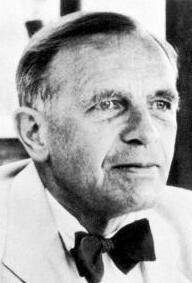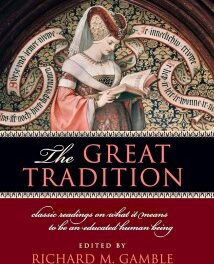We support our Publishers and Content Creators. You can view this story on their website by CLICKING HERE.
Wilhelm Röpke developed what was called “humane economics,” which placed the dignity of the human person at the core of economic thought, theory, and practice.
In August 1938, as the world teetered on the brink of a second World War, only twenty years after the ending of the previous global conflagration, a group of economists met in Paris to discuss how to address the economic and political crisis of the time. The Walter Lippman Colloquium was named after the famous American journalist, whose recently published book The Good Society had inspired the French philosopher, Louis Rougier, to call the meeting of influential economists.
With patriotism poisoned in Hitler’s Germany and Mussolini’s Italy, and with socialism turning toward totalitarianism in Stalin’s Soviet Union, the group of economists sought to find ways in which the world economy could serve the cause of peace and freedom. Most of those in attendance sought socialist or free market capitalist solutions, many of which have since been tried and found wanting or, which is worse, have laid the foundations for the globalist tyranny which now plagues the world.
There was, however, one economist at the colloquium who spoke with wisdom and clarity. This was Wilhelm Röpke, a German economist who had, with his family, left his native land in 1933 upon the rise to power of the Nazis. At the time of the colloquium, he had a position with the Graduate Institute of International and Development Studies in Geneva.
Having rejected the socialism of his youth and the free market ideas of Ludwig von Mises, with which he had once agreed, he developed what was called “humane economics,” which placed the dignity of the human person at the core of economic thought, theory, and practice. He was a political decentralist, mistrusting the power of the state while also rejecting the naivete of believing that the market can ever be free from manipulation by those possessing economic and political power.
As for Keynesian economics, he saw it as the abandonment of humanity to a reductionist understanding in which the human person is seen merely as homo economicus, whose purpose was to serve as a cog in the empirically conceived economic mechanism as both a producer and consumer. Speaking of this Keynesian understanding of the economy, Röpke derided it as “a typically intellectual construction that forgets the social reality behind the integral calculus.”
Röpke considered his “economic humanism” to represent the just alternative to the Big Government solutions of the socialists or the Big Business laissez-faire liberalism advocated by the Austrian School of economists. The domination of Big Government and Big Business was a threat to political and economic freedom. “The tendency toward economic concentration,” he stated at the colloquium, “…is attributed especially to the development of technology and mechanization…. Businesses become bigger, the number of competitors becomes smaller…. This tendency toward large enterprises creates monopoly.”
Röpke understood, as few did,that the perceived alternatives of socialism and corporate capitalist gigantism were not really opposing positions but merely two sides of the same centralizing coin. He understood that Big Government and Big Business made very comfortable bedfellows (to switch metaphors) and that the solution to this monopolizing of power into the hands of an unholy alliance of politicians and plutocrats was the humane economy, which he called the Third Way, and which has much in common with Catholic social teaching.
In accordance with the teaching of Pope Leo XIII and Pius XI, and as advocated by Belloc and Chesterton, Röpke called for the “deproletarianization” of society through localism and the restoration of widely dispersed small property holdings. Once people became property owners, they would become rooted in their local cultures and economies, thereby eradicating the rootlessness of the propertyless masses. The right to private property was necessary for the attainment and retention of political and economic liberty.
As with the other great “unsung” economist, E.F. Schumacher, whom we’ve already featured in this series, he was certainly lauded in his own day for his radical contribution to clarity in economic thought. Schumacher’s Small Is Beautiful was an international bestseller, and Röpke’s “Third Way” was adopted by the government of his native land in the years after World War II and would contribute significantly to the Wirtschaftswunder, Germany’s “economic miracle,” which saw the West German economy rise from the ruins of post-war poverty to a position of economic dominance in Europe.
As with Schumacher, Röpke came to realize and to stress the importance of religion to the health of society. Unlike Schumacher, he never converted to Catholicism. Nonetheless, he admired the economic teaching of Pius XI, as did Schumacher, and lamented the rupture of Christendom caused by the Protestant Reformation. Toward the end of his life, he spoke candidly of the spiritual realities that supersede all other aspects of human life:
[T]he malady from which our civilization suffers lies in the individual soul and is only to be overcome within the individual soul. For more than a century, we have made the hopeless effort, more and more baldly proclaimed, to get along without God and vaingloriously to put man, his science, his art, his political contrivances, in God’s place… It is as though we had wanted to add to the already existing proofs of God’s existence, a new and finally convincing one: the universal destruction that follows on assuming God’s non-existence.
The sleeve notes to the third edition of Röpke’s classic work The Humane Economy, published by ISI Books in 1998, proclaims that “Röpke’s observations are as startlingly relevant today as when they were first set forth some four decades ago.” Today, more than a quarter of a century later, the same can still be said.
The back cover of the ISI edition of Röpke’s book quotes the following judgment from The New York Times: “If any person in our contemporary world is entitled to a hearing it is Wilhelm Röpke.” The fact that The New York Times has since become the mouthpiece of the monopolizing mania of globalism merely proves that Röpke’s wisdom remains unheeded. We can only hope that more will hearken to his voice, which is that of a prophet of common sense and sanity in a world which has lost its senses and its sanity.
Republished with gracious permission from Crisis Magazine (September 2024).
This essay is part of a series, Unsung Heroes of Christendom.
The Imaginative Conservative applies the principle of appreciation to the discussion of culture and politics—we approach dialogue with magnanimity rather than with mere civility. Will you help us remain a refreshing oasis in the increasingly contentious arena of modern discourse? Please consider donating now.
The featured image is “Allegory of Trade” (1743) by John Theodore Heins, and is in the public domain, courtesy of Wikimedia Commons. The image of Wilhelm Röpke is licensed under the Creative Commons Attribution-Share Alike 3.0 Unported license, courtesy of Wikimedia Commons.
Share This Story, Choose Your Platform!
Go to Top

 Conservative
Conservative  Search
Search Trending
Trending Current News
Current News 







